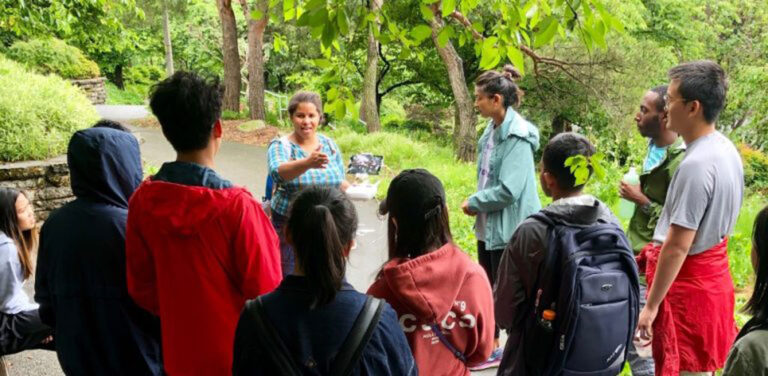Mainstreaming Human Rights in Geography and the AAG
 Nearly all geographers are concerned about human rights, and in their personal and professional lives seek meaningful ways to act on these concerns and values. The AAG and the discipline of geography intersects with human rights in numerous ways. This special theme within the 2017 AAG Annual Meeting will explore intersections of Human Rights and Geography, and will build on the AAG’s decade-long initiatives on Mainstreaming Human Rights in Geography and the AAG. An Interview with Noam Chomsky by Doug Richardson will keynote this theme at the 2017 Boston Annual Meeting.
Nearly all geographers are concerned about human rights, and in their personal and professional lives seek meaningful ways to act on these concerns and values. The AAG and the discipline of geography intersects with human rights in numerous ways. This special theme within the 2017 AAG Annual Meeting will explore intersections of Human Rights and Geography, and will build on the AAG’s decade-long initiatives on Mainstreaming Human Rights in Geography and the AAG. An Interview with Noam Chomsky by Doug Richardson will keynote this theme at the 2017 Boston Annual Meeting.
This theme will feature 50 sessions with more than 250 presentations at the intersection of human rights and geography. Speakers from leading human rights organizations, academia, government, and international organ- izations will address human rights challenges around the world.
A sampling of featured speakers includes:
- Noam Chomsky, Institute Professor and Professor of Linguistics Emeritus, MIT
- Mike Posner, former Assistant Secretary of State for Human Rights
- Terry Rockefeller, Board of Directors, Amnesty International USA
- Colette Pichon Battle, Executive Director, US Human Rights Network
- Stéphane Bonamy, Deputy Head, International Committee of the Red Cross
- Lee Schwartz, Director, Office of the Geographer and Global Issues, US State Department
- Susannah Sirkin, Director of International Policy and Partnerships, Physicians for Human Rights
- Jessica Wyndham, Interim Director, Scientific Responsibility, Human Rights and Law Program, AAAS
- Eric Rosenthal, Executive Director and Founder, Disability Rights International
- Douglas Richardson, Executive Director, American Association of Geographers
- Beth Simmons, U-Penn Law and NAS Committee on Human Rights
- Harvard Humanitarian Initiative (four presenters from Harvard)
- Audrey Kobayashi, Queen’s University
- Hilary Zainab, Research Director, Standby Task Force
- Kathryn Hanson, Smithsonian Museum Conservation Institute
- Sheryl Beach, University of Texas at Austin
- Balakrishnan Rajagopal, Head, International Development Group, MIT
- Colin Kelley, Columbia Center for Climate and Security
- Stephen Marks, Department of Global Health and Policy, Harvard University
- Tawanda Mutasah, Senior Director for Law and Policy, Amnesty International
Sample session topics include:
Wednesday, April 5
- Health and human rights
- Crime, brutality, and violence
- Global Carceral Geographies I: Carceral Experiences
- Global Carceral Geographies II: Carceral Societies
- Global Carceral Geographies III: Confining the Other
- Global Carceral Geographies IV: Carceral Intersections
- (De)Stigmatising Sexscapes: Politics, Policy and Performance I: Porn, Pleasure & Performance
Thursday, April 6
- Human Rights: Humanitarian Disaster Response and Protecting Cultural Heritage
- Right to water and safe environments
- (De)Stigmatising Sexscapes: Politics, Policy and Performance II: 2. Rights, Wrongs and Regulations
- Documenting Evidence for Human Rights Tribunals and Litigation Using Geographic Research and Tools
- Mainstreaming Human Rights in Geomorphology and Water Resources
- (De)Stigmatising Sexscapes: Politics, Policy and Performance III: 3. Governance, Policing and Design
- Updates and Trends at AAAS and the SHRC
- Harvard Humanitarian Initiative panel
- (De)Stigmatising Sexscapes: Politics, Policy and Performance IV: 4. Production, Consumption and Reflection
- Article 15: Understanding the Human Right to the Benefits of Science to Help Progress and Its Applications
- (De)Stigmatising Sexscapes: Politics, Policy and Performance V: 5. Mobilities, Immobilities and Boundaries
- Noam Chomsky Interview—A Continuing Conversation with Geographers
Friday, April 7
- Social Media and Activism: Media and Communication Geography Session IV
- Indigenous and marginalized groups
- Policymaking under a human rights framework
- Human Rights and Climate Change – Featured Panel
- Geographies of Disability 1
- Trump on Immigration Enforcement: the First 100 Days
- Geographies of Disability 2
- Refugees, asylum seekers, and IDPs
- Emerging geographies of Post-Apartheid South Africa
- Human rights education and research practice
- Geographies of Disability 3
Saturday, April 8
- Territorial Articulations and Shifting Legal Geographies: Indigenous and Native Rights in the Americas 1
- Planning the (White) City: Neoliberal Urbanism and the Rise of the Homogenous City I
- Human Rights and Disabilities: High-Level Perspectives From the Academy and Beyond
- Territorial Articulations and Shifting Legal Geographies: Indigenous and Native Rights in the Americas 2
- Planning the (White) City: Neoliberal Urbanism and the Rise of the Homogenous City II
- Human Rights Featured Panel
- Confronting the (White) City: A Conversation
- Indigenous Peoples and Climate Change
- David Harvey Featured Lecture
- Indigenous Peoples and Climate Change II
- Sex and Gender in Election 2016
- Historical Geography Specialty Group Plenary: Audrey Kobayashi
- AAG Past President Election Panel
Sunday, April 9
- Geographies of Aging, Health and Health Care 1
- Spaces of Informality and the Governing of Slums
- Geographies of Aging, Health and Health Care 2
- Gender, sexual identity, and human rights
- Geographies of Aging, Health and Health Care 3
- Land Rights and Colonialism
- Racial Scars that Still Reflected on the Space
- Urban inequalities
AAG Human Rights Initiatives
During the past decade, the AAG has undertaken many initiatives to interact geography with human rights organizations and their work. A few examples include:
Science and Human Rights Coalition (SHRC): Hosted by the AAAS, the SHRC brings together dozens of scientific associations to advance crucial human rights work around the world.
AAG Geography and Human Rights Clearinghouse: With funding from the MacArthur Foundation, the AAG developed an inventory of geographic research and scholarship relating to human rights including bibliographic, informational, and research resources.
Geospatial Technologies and Human Rights: The AAG supported this AAAS project to develop applications and information resources for the non-governmental human rights community.
For more information, please visit https://www.aag.org/cs/geohumanrights.

